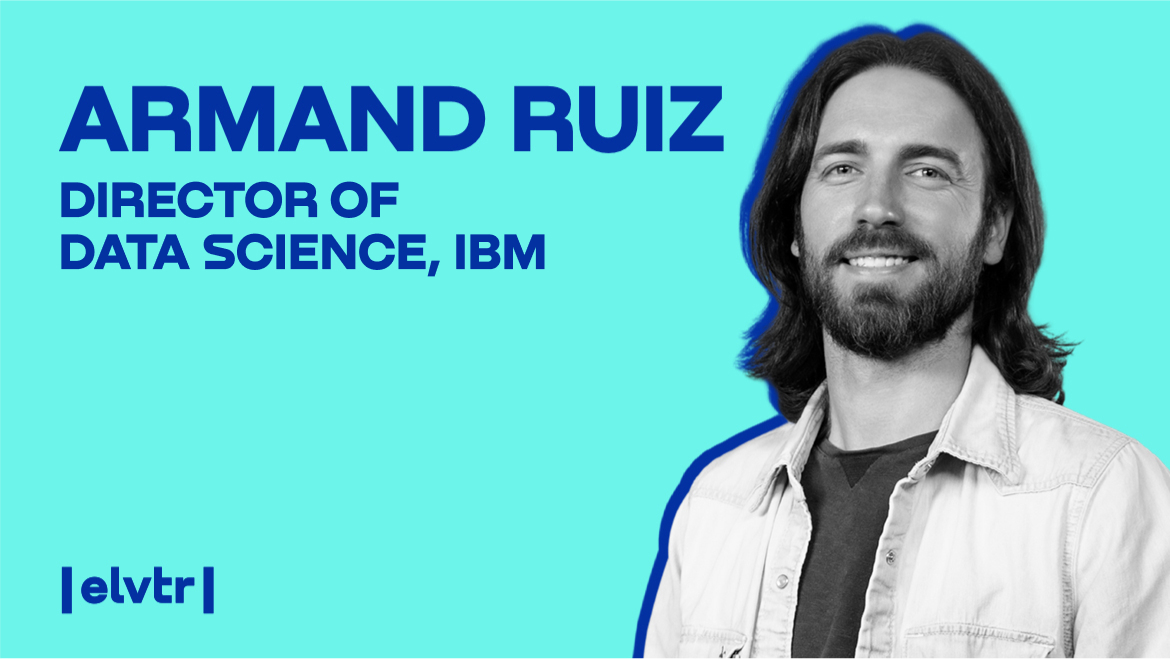- MAIN PAGE
- – elvtr magazine – ARMAND RUIZ: "AI IS LIKE AN EXTENSION OF THE HUMAN."
ARMAND RUIZ: "AI IS LIKE AN EXTENSION OF THE HUMAN."

Armand Ruiz is a young data science director at IBM. But do not be confused with his young age — Armand is a top Silicon Valley expert on artificial intelligence and machine learning. Starting as a telecommunication engineer graduate, he later joined Vodafone and then IBM, where he quickly climbed the ranks.
In the last 10 years, Armand’s work has been behind IBM’s most pioneering projects, such as Watson, and the most complex AI implementations for the company. Exhausted by the use of ‘technical jargon’, he has been pushing AI in business with a clear philosophy: present the power of AI by making it accessible and transparent.
We had a chance to interview Armand to get to know him better and learn his view on a variety of topics:
- What is AI and what are the myths?
- How does AI benefit businesses?
- What is the course about?
- What will AI look like in the future?
MAKING COMPUTERS IS A THING OF THE PAST. AT IBM, AI IS THE FOUNDATION OF EVERYTHING WE DO.
How did you get where you are now?
I studied telecommunication engineering, so I did not start my career studying AI or data science. I joined IBM the summer Watson was announced, and it was already very clear that was the future. In the first couple of years, I worked as a data scientist consulting various clients.
I had many ideas on how we could simplify the process, I felt that everyone was overcomplicating the solutions. So, I joined the IBM Watson team to be a product manager, I worked there for five years building what I believe are the simplest tools to inject AI in any business.
Now I’m back ‘on the field’, I manage a team of almost a hundred data scientists, and we are currently working on 30 projects in different domains.
DATA IS ALWAYS THE FOUNDATION OF AI
What is AI?
The simplest way to define AI is "the use of technology and algorithms to make predictions of the future using historical data". So that is why data is always the foundation of AI. Data are used to train models and create algorithms; AI predictions are employed to either automate or plan the next best action. There are a million different outcomes.
We are already interacting with AI on an everyday basis. Here's a couple of examples, to give you an idea of what your daily life would be like without AI:
- Your email will be full of spam;
- Your Netflix or YouTube would be just a list of content;
- You would not have image recognition on your photo album;
- There won’t be any targeted marketing campaigns;
- When you take a flight — there would be more delays;
- You will have to stay on the phone for hours for any customer service.
A COMMON IDEA IS THAT YOU NEED A VERY EXPENSIVE, HIGHLY SKILLED, AND TECHNICAL TEAM. THAT’S NOT TRUE.
What are the common misconceptions around AI?
I think that what is misunderstood is, firstly, that AI can solve all problems magically. And second, there is a misconception on how accessible technology is today. There are a lot of tools, a lot of techniques, and practices that can give the power of AI to almost anybody without having to hire top-notch Ph.D. data scientists.
A common idea is that you need a very expensive, highly skilled, and technical team. That’s not true. There are a lot of options out there that can give you a head start.
What are the main roadblocks of AI?
The main roadblock is data. Sometimes the lack of data, sometimes the abundance of data. Data is the foundation of AI, and having the information architecture is key to organize and prepare the data. Obviously, privacy is another concrete roadblock, as well as putting AI in the business context.
MANAGERS, THAT USE AI WILL REPLACE THOSE MANAGERS WHO DON’T USE AI.
How can a regular, non-tech business user benefit from using and applying AI?
Regular business users benefit from AI by applying it to new ideas that they can only solve using this set of technologies, or by checking the processes they are already implementing and optimize them. An executive at IBM is used to says: “Managers that use AI will replace those managers who don’t use AI”. So, it is basically giving you superpowers. I believe that any regular business use today should be aware of the possibilities of AI and what are the steps in order to be successful.
In the near future, anybody will be required to explain the value of AI and how to deliver an AI project. Whoever possesses that skill set right now is going to be far ahead of any colleagues or competitors. It is going to open so many doors. Any business leader, any manager, who is trying to reach those roles is going to have a huge competitive advantage.
I will give you an example:
I’m a big fan of Copy.ai. 6 months ago, two guys with no AI or data science skills created one of the most powerful AI solutions available out there. They are basically just using the AI tools available out there to implement AI solutions very quickly.For me, it is the perfect example of how only two people can build a successful business without any technical data science skills, just by understanding the foundation and the values of AI.
Anybody in the business context is supposed to know how to handle emails, presentations, word documents. AI is going to become the same.
What do you look at when you hire people?
Well, obviously people who know the domain. But also, people who know how to simplify an AI project and deliver business value right away. For me, this is the critical aspect.
Storytelling as well, because at the end of the day is very important to be able to understand and communicate the results. AI is all about experimentation. So, you need a very agile mentality.
AI IS NOT JUST FOR THE BIG TECH COMPANIES. ANY SMALL BUSINESS, ANY STARTUP CAN START IMPLEMENTING AI SOLUTIONS.
What is the course about?
First, we are going to cover the AI life cycle end to end, going from ‘what data do I need’, ‘how do I prepare the data’, ‘which models should I train?’, ‘how do I train them?’.
We will also make it practical by actually doing it. We will train our first model, put it into production, and understanding how to explain those results.
Second, we will cover agile AI, evaluating investments and defining roles and responsibilities. And finally, we will talk about how to work with data scientists and describe the most popular use cases of AI for different industries.
For example, computer vision is a very popular use, whether is image recognition, fraud detection, targeted marketing campaigns, or something really advanced like video image for self-driving cars.
AI is not just for the big tech companies. Any small business, any startup can start implementing AI solutions.
Who is the course designed for?
The course is designed for managers, business leaders, and non-technical users that want to apply AI and go that extra mile to either save costs or innovate in their domain.
Participants will be able to explain what AI is and put the various tools into context: ‘what do you need for what’. They will be able to define a project plan, create goals and communicate results, and choose which tools are the best depending on the skill set available.
Basically, what we are going to do in this course is we are going to give students the blueprint to succeed in delivering an AI project and get value from it, even with a low budget.
AI is like an extension of the human. It will give you superpowers to do more and to reach things you could not have done before.
AI IS LIKE AN EXTENSION OF THE HUMAN. IT WILL GIVE YOU SUPERPOWERS TO DO MORE AND TO REACH THINGS YOU COULD NOT HAVE DONE BEFORE.
What is your stance on AI for the future? What can we expect to be a reality in ten years?
I think one of the big parts of AI is adding trust and transparency, for example being able to understand when AI is making predictions or decisions and to understand how AI is making them. I think that in that sense AI will become smarter, it is going to be able to behave more naturally and will be more transparent in the way it behaves.
On the other side, AI will be super simple to use, the same way people are using Excel today. Building AI solutions is also going to be very straightforward. For business people, it will basically automate any singular manual task they are doing in their daily job.
I will give you a concrete example. Take the healthcare sector, a sector in which we are seeing the most innovation. The way we are already distributing Covid vaccines at such a high rate is powered by AI analysis on how many vaccines are needed in which areas.
In the future, AI is going to be able to predict diseases or create new drugs. It will be able to make more precise diagnoses and explain the best ways to proceed with treatment.
*ELVTR is disrupting education by putting proven industry leaders in a virtual classroom with eager rising stars. ELVTR courses offer 100% instructor driven content designed to give you practical knowledge within a convenient time frame. Choose the right course for you!


